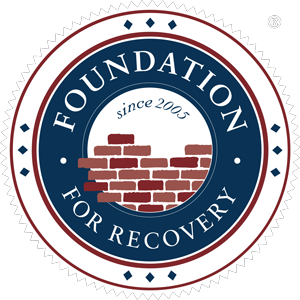
Enriching and welcoming spaces. Unlike a treatment center, recovery centers are non-clinical community centers that act as a hub for events, support, trainings, workshops, and a safe haven open to the public, and powered by local communities of recovery.
Foundation for Recovery, as Nevada’s statewide recovery community organization, has two recovery community centers serving as central hubs for all our work. Our Recovery Community Centers are an open place where individuals ranging from new to long-term recovery and their families can have access to resources, socialization, support, and skill-building. They provide a warm and inviting community setting for anyone seeking recovery services and afford a wide range of amenities like access to computers, life-skills classes, a place to relax, attend a meeting or social event, and where individuals can receive one-on-one peer support services. The purpose of our center is to offer an atmosphere of hope, wellness, and care for better living in recovery.
Each center has ties to a variety of community resources and organizations to assist program participants to rebuild their lives and self-esteem.
Our programs and initiatives span across Nevada, including urban, rural, and frontier communities. Our Recovery Community Centers provide warm and enriching spaces for anyone seeking support and a sense of community.
One-on-one support to help you achieve your goals in recovery. Work with your own peer support specialist and create a recovery plan to meet your needs and goals.
Our recovery community centers provide space for many mutual-aid meetings and support groups available to the community most times of the day.
Find a range of resources and supportive amenities. Recycled clothing, wifi and computer labs, library and literature, transportation assistance and more.
Through partnerships and the talented skills of people from local communities of recovery, we plan fun and engaging events and activities throughout the week.
Prepare for college, finish your GED, learn a new skill, or develop your understanding of recovery and addiction. In-person, online, and on-demand classes.
Together, we advocate to combat stigma, prevent overdose, and enhance community recovery supports in Nevada.
Our recovery community centers are a place for the local recovery community and our partners to gather, share their skills, and support each other. Contact us if you’re interested in using the recovery centers for your meeting, service, or your next event.

Located in the heart of Las Vegas and open to the greater Southern Nevada regions.
Center Manager Las Vegas, NV southcenter@forrecovery.org (702) 257-8199
Peer Recovery Support Specialist Las Vegas, NV (702) 257-8199
Peer Recovery Support Specialist Las Vegas, NV (702) 257-8199
Peer Recovery Support Specialist Las Vegas, NV (702) 257-8199
Peer Recovery Support Specialist Las Vegas, NV (702) 257-8199
Peer Recovery Support Specialist Las Vegas, NV (702) 257-8199
Peer Recovery Support Specialist Las Vegas, NV (702) 257-8199
Recovery Community Organizations (RCOs) exist in states all across the country. Many states have a single statewide recovery community organization, like Foundation for Recovery, with several regional RCOs and Recovery Community Centers (RCCs) operating within their community, with autonomy and independence from the statewide RCO, but as a part of a statewide network.
The statewide RCO will often assist recovery community centers with research, evaluation, training, standards of quality, and at times, fundraising and administrative support. Operating as a network with a statewide RCO providing technical assistance and support, helps coordinate recovery support services, advocacy initiatives, and recovery-oriented systems of care across the state.
If you or your organization is interested in becoming or starting a recovery community center in your area, we can assist you with technical assistance, guidance, and more information about joining the statewide network of recovery community centers in Nevada.
The Association of Recovery Community Organizations (ARCO) at Faces & Voices of Recovery brings together established, new, and emerging groups to build the unified voice of the organized recovery community. It leverages the profile and unifying force of Faces & Voices for member organizations, while building the capacity and leadership of the organized recovery community.
A recovery community organization (RCO) is an independent, non-profit organization led and governed by representatives of local communities of recovery.
These organizations…
An RCO may also have physical community centers, called Recovery Community Centers (RCC).
There are over 100 established recovery community organizations (RCOs) within the Association of Recovery Community Organizations (ARCO). They help bridge the gap between professional treatment and building healthy and successful lives in long-term recovery. They increase the visibility and influence of the recovery community and engage in one or more of three core activities:
To ensure fidelity to the RCO model, Faces & Voices of Recovery has identified the following criteria as national best practices for recovery community organizations.
1. Non-profit Organization
The organization is a non-profit with current 501c3 status. (In some cases, the RCO is under the umbrella of a parent organization. These RCOs have a governing structure that is sufficiently independent from the parent organization to be autonomous in their authority and decision-making.)
2. Led and Governed by the Recovery Community
The organization is peer-led. More than 50% of the Board of Directors self-identify as people in recovery from their own substance use disorders.
3. Primary Focus is Recovery from Substance Use Disorders
The organization’s mission and vision include a primary focus on recovery from substance use disorders. Some organizations also provide ancillary activities such as prevention services, housing, other addictions and/or mental health peer services. However, the primary function of an RCO is focused on substance use disorders.
4. Grassroots
Community engagement is grassroots and reflective of the community served. The organization provides opportunities for all community members to get involved in volunteering, participating in activities, and planning events and programs. Examples of ways to engage local communities of recovery are visible on the website and evident in program delivery.
5. Participatory Process
Participatory process is understood, valued and evident in the design and implementation of outreach, programs and services. Participatory Processes (PP) are specific methods employed to achieve active participation by all members of a group in a decision making process.
6. Non-clinical Services
Services provided are 100% non-clinical. Examples of clinical services include DUI assessments, counseling, drug testing and medication management. Examples of non-clinical services include, but are not limited to, recovery support groups, recovery coaching, telephone recovery support, skill-building groups, public awareness events, harm-reduction activities, substance-free recreation, and recovery celebrations.
7. All Pathways of Recovery
The organization supports, allows for, and may provide opportunities for all pathways of recovery and does not exclude anyone based on their pathway. This includes support for strategies and ideas aimed at reducing negative consequences associated with drug use.
8. Recovery-Friendly Language
Words matter and working to change the language around substance use disorders may help individuals identify less with negative terms and more with neutral terms around substance use. Caution needs to be taken when designing RCO websites and materials. Every effort should be made to refrain from using stigmatizing words such as “addict.” Recommended replacements are “person with a substance use disorder” or “person in recovery”.
Some states have organized a consortium of recovery community centers operating independently but as a part of the state’s statewide recovery community organization.
Successful recovery community organizations learn from one another and build networks of support. In Vermont, the Vermont Recovery Network is a consortium of that state’s eleven recovery community centers. Faces & Voices Association of Recovery Community Organizations is a network of recovery community organizations across the country. The New England Alliance for Addiction Recovery (NEAAR) is a region wide association of recovery community organizations. There are growing relationships between recovery community organizations across the world. More information can be found on Faces & Voices International Recovery Resources Guide
Nevada has one statewide recovery community organization, Foundation for Recovery, and two local recovery community centers. If you’re interested in organizing a local recovery community center and joining the growing network in Nevada, please contact us at info@forrecovery.org
The Foundation for Recovery is a tax-exempt charitable organization under the Internal Revenue Code Section 501 (c) 3, Tax ID No. 203380211. Your donation may be tax-deductible (pursuant to NRS 598).
© 2020 Foundation For Recovery, Inc. All rights reserved. Foundation For Recovery, FFR, the Foundation For Recovery logo, and certain other marks are owned by Foundation For Recovery, Inc.

The Southern Nevada Recovery Community Center offers several spaces open to the groups and organizations to rent for meetings, support groups, trainings, and events. Learn more or contact therooms@forrecovery.org for more information.
Recovery Friendly Workplace Ambassador
Person-centered recovery is directed, as much as possible by the person – including decisions about who should be included in the process. The planning identifies just a few small, but meaningful, short-term changes that the individual can focus on helping to reduce some of the barriers or challenges moving forward. Person centered care should be central to all recovery frameworks.